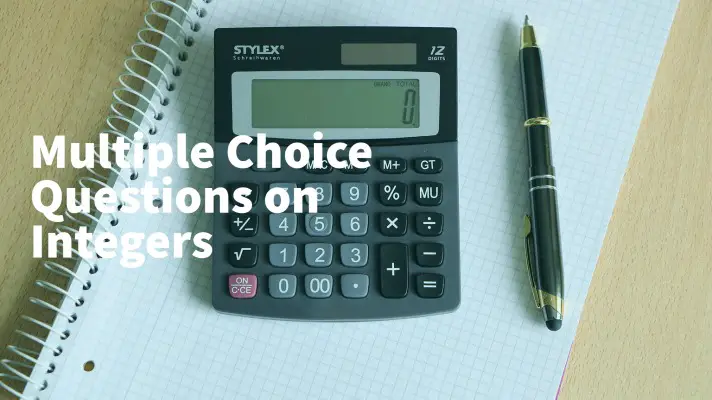Are you getting fear of MCQ question in mathematics? If yes, you are in the right place where you can make yourself strong in MCQ questions. In this article, I will discuss about the Multiple Choice Questions on Integers.
There is also a quiz on integer. I hope that you will get interest till the end of this article.
At the end of this article, you can download the PDF format of this MCQ sheet.

MCQ Questions on Integers
- (a+1) is called the ________of a.
- predecessor
- successor ✔️
- none of these
- (a-1) is called the ______ of a
- predecessor ✔️
- successor
- none of these
- The successor of 21 is
- 22 ✔️
- 20
- 19
- 23
- The additive inverse of 15 is ______.
- 16
- 0
- 15
- -15 ✔️
- Which of the following is called as additive identity?
- 1
- -1
- 0 ✔️
- none of these
- Which one of the following is as per commutative law of addition?
- b+c = c+b ✔️
- (b+c)+a = b+ (c+a)
- b-c = -(c-b)
- none of these
- Which one of the following is as per associative law of addition?
- b+c = c+b
- (b+c)+a = b+ (c+a) ✔️
- b-c = -(c-b)
- none of these
- Which one of the following is as per commutative law of multiplication?
- 4*5 = 5*4 ✔️
- 5*3 = 15
- (5+4)*2 = 2*5+2*4
- none of these
- Which one of the following is as per distributive law ?
- 4*5 = 5*4
- 5*3 = 15
- (5+4)*2 = 2*5+2*4 ✔️
- none of these
- Find the product: (-5)x(5)x(-4)=____
- 100 ✔️
- -100
- 25
- 20
- Simplify: (-10)x2-(-20)x(-4) = ___
- 100
- 60
- -60
- -100 ✔️
- Simplify: (-10)x3-(-20)x5 = ___
- -70
- 130
- 70 ✔️
- -130
- Simplify: (-5x-4)-(8+2) = ___
- -10
- 10 ✔️
- 30
- -30
- Find the value of : (-42) – (-35)
- -7 ✔️
- 7
- 77
- -77
- Find the value of: (6- 18) x (-2) x 50
- -24
- 24 ✔️
- 48
- -48
Math Quiz on Integer
Here is a mcq based test. You must appear for the test to evaluate yourself.
You may consider this as a test of 30 marks on “Integers”. After completion of the test, you can check the answers and can come to know how much you are prepared.
Overview
If you face any type of problem in answering, then read the following text. After reading the entire chapter- ‘Integer‘, don’t miss to re-appear for the test to know your progress.
What is an Integer?
An Integer is a number which can be written without a fractional component.
The set of integers is denoted by the symbol-‘Z’
Examples of Integer
The following numbers are the integers-
- The whole numbers
- Zero
- The counterpart of the whole numbers
What are the whole numbers?
The positive natural numbers and zero are called whole numbers. These are also called counting numbers.
(0,1,2,3,4,5,……..)- are the whole numbers.
It is denoted by the symbol-‘W’
What are negative Integers?
The additive inverses of the positive integers are the negative integers.
(-1,-2,-3,-4,-5,………) are the negative integers.
Properties of Integer
Closure property:
If a and b are integers then
- (a + b) is also an integer
- a x b is also an integer
Associative property
When a, b, and c are integers
- a+( b + c) = (a + b)+c
- a x (b x c) = (a x b) x c
Commutative property
When a and b are integers then,
- a + b = b + a
- a x b = b x a
Identity property
When a is an integer then,
- a + 0 = a
- a x 1 = a
Inverse property
If a is an integer then,
- a + (-a) = 0
- The only invertible integers are (-1) and 1.
Distributive property
When a, b, and c are integers,
- a x (b + c) = (a x b) + (a x c)
- (a + b) x c = (a x c) + (b x c)
Non-zero divisors
If a x b = 0, then
- either a = 0
- or b = 0
- or a and b both equal to 0.
For more details about integer, click on:
What is natural numbers?
The non negative whole numbers i.e. the positive whole numbers starting from 1 to infinity are the natural numbers.
1,2,3,4,5,6,7,8,9,10,………inifinity- all are natural numbers.
Zero is neither positive nor negative integer. Hence, it is not a natural number.
All natural numbers are whole numbers, but all whole numbers are not natural numbers.
Properties of zero
Zero is
- neither a positive number nor a negative number.
- an integer.
- a whole number.
- not a natural number.
- an even number.
- a multiple of all numbers.
- not a prime number.
- no number can be divided by zero, but zero can be divided by any number.
- Any number to the power of zero is equal to 1; e.g. 50=1
I hope that the multiple-choice questions mentioned here, the basic questions from the chapter- “Integers” will help you. I also hope that the text on Integer mentioned above will clarify all the doubts that you have. If you have any further doubt on “Integer”, please don’t forget to write the same in the comment box so that I can clarify. Best wishes!


